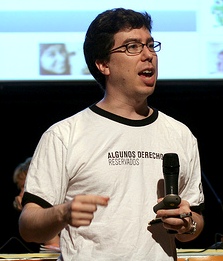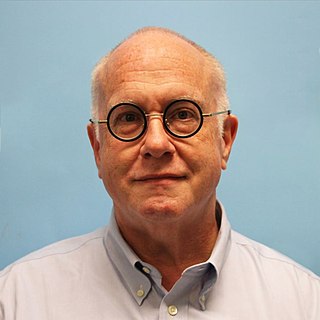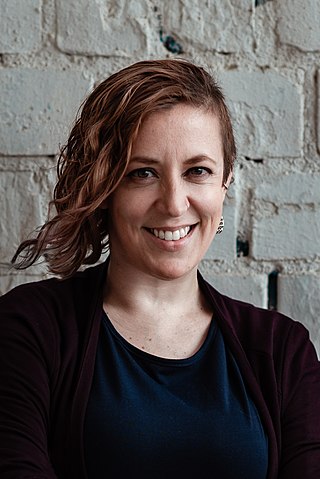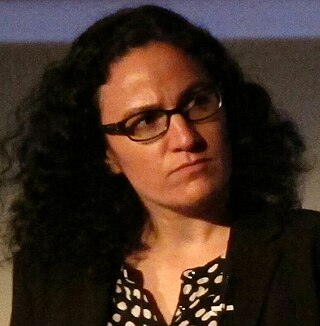Related Research Articles

John Perry Barlow was an American poet, essayist, cattle rancher, and cyberlibertarian political activist who had been associated with both the Democratic and Republican parties. He was also a lyricist for the Grateful Dead, a founding member of the Electronic Frontier Foundation and the Freedom of the Press Foundation, and an early fellow at Harvard University's Berkman Klein Center for Internet & Society.

Jonathan L. Zittrain is an American professor of Internet law and the George Bemis Professor of International Law at Harvard Law School. He is also a professor at the Harvard Kennedy School, a professor of computer science at the Harvard School of Engineering and Applied Sciences, and co-founder and director of Harvard's Berkman Klein Center for Internet & Society. Previously, Zittrain was Professor of Internet Governance and Regulation at the Oxford Internet Institute of the University of Oxford and visiting professor at the New York University School of Law and Stanford Law School. He is the author of The Future of the Internet and How to Stop It as well as co-editor of the books, Access Denied, Access Controlled, and Access Contested.
Center for Democracy & Technology (CDT) is a Washington, D.C.–based 501(c)(3) nonprofit organisation that advocates for digital rights and freedom of expression. CDT seeks to promote legislation that enables individuals to use the internet for purposes of well-intent, while at the same time reducing its potential for harm. It advocates for transparency, accountability, and limiting the collection of personal information.

Zoë Eliot Baird is an American lawyer and president of the Markle Foundation. She is known for her role in the Nannygate matter of 1993, which arose when she was nominated by President Bill Clinton as the first woman to be Attorney General of the United States, but she withdrew her nomination when it was discovered she had hired illegal aliens and failed to pay Social Security taxes for them. Since 1998, she has led the Markle Foundation.

The Berkman Klein Center for Internet & Society is a research center at Harvard University that focuses on the study of cyberspace. Founded at Harvard Law School, the center traditionally focused on internet-related legal issues. On May 15, 2008, the center was elevated to an interfaculty initiative of Harvard University as a whole. It is named after the Berkman family. On July 5, 2016, the center added "Klein" to its name following a gift of $15 million from Michael R. Klein.

Yochai Benkler is an Israeli-American author and the Berkman Professor of Entrepreneurial Legal Studies at Harvard Law School. He is also a faculty co-director of the Berkman Klein Center for Internet & Society at Harvard University. In academia he is best known for coining the term commons-based peer production and his widely cited 2006 book The Wealth of Networks.

Wendy Seltzer is an American attorney and, as of January 2023, a staff member at Tucows where she is the Principal Identity Architect. She is known for her many years of work with the World Wide Web Consortium, where, among many roles, she was the chair of the Improving Web Advertising Business Group.

Cindy Cohn is an American civil liberties attorney specializing in Internet law. She represented Daniel J. Bernstein and the Electronic Frontier Foundation in Bernstein v. United States.

"A Declaration of the Independence of Cyberspace" is a widely distributed early paper on the applicability of government to the rapidly growing Internet. Commissioned for the pioneering Internet project 24 Hours in Cyberspace, it was written by John Perry Barlow, a founder of the Electronic Frontier Foundation, and published online on February 8, 1996, from Davos, Switzerland. It was written primarily in response to the passing into law of the Telecommunications Act of 1996 in the United States. In 2014, the Department of Records recorded and released audio and video content of Barlow reading the Declaration.
Sarah Beth Deutsch is an American attorney who was Vice President and Deputy General Counsel of the telecommunications company Verizon Communications until her retirement in 2015. Since leaving Verizon, she is a practicing attorney in the Washington, D.C. area handling copyright, trademark, privacy and internet policy issues.

Michael Wayne Godwin is an American attorney and author. He was the first staff counsel of the Electronic Frontier Foundation (EFF), and he created the Internet adage Godwin's law and the notion of an Internet meme. From July 2007 to October 2010, he was general counsel for the Wikimedia Foundation. In March 2011, he was elected to the Open Source Initiative board. Godwin has served as a contributing editor of Reason magazine since 1994. In April 2019, he was elected to the Internet Society board. From 2015 to 2020, he was general counsel and director of innovation policy at the R Street Institute. In August 2020, he and the Blackstone Law Group filed a lawsuit against the Trump administration on behalf of the employees of TikTok, and worked there between June 2021 and June 2022. Since October 2022, he has worked as the policy and privacy lead at Anonym.
The Electronic Frontier Foundation (EFF) is an international non-profit digital rights group based in San Francisco, California. The foundation was formed on 10 July 1990 by John Gilmore, John Perry Barlow and Mitch Kapor to promote Internet civil liberties.

Susan P. Crawford is the John A. Reilly Clinical Professor of Law at Harvard Law School. She served as President Barack Obama's Special Assistant for Science, Technology, and Innovation Policy (2009) and is a columnist for WIRED. She is a former Board Member of ICANN, the founder of OneWebDay, and a legal scholar. Her research focuses on telecommunications and information law.

Jillian C. York is an American free-expression activist and author. She serves as Director of International Freedom of Expression at the Electronic Frontier Foundation (EFF), and a founding member of Deep Lab. She is the author of Silicon Values: The Future of Free Speech Under Surveillance Capitalism and Morocco - Culture Smart!: the essential guide to customs & culture.
Lori Fena is an American internet activist, entrepreneur, and author, best known as the former director of the Electronic Frontier Foundation from 1995 to 1998 and author of "The Hundredth Window". Fena is currently the co-founder and VP of Business Development for Personal Digital Spaces and Founder and executive director of the Sustainable Information Economy.
The copyright law of Panama is primarily based on 1994 legislation, known as Law 15. The history of Panamanian intellectual property legislation dates to the 19th century. Only recently has copyright in Panama became seriously enforced, with past international criticism focusing on insufficient effort to enforce intellectual property laws. A new 2012 law has attracted concerns in the opposite direction, with many criticising it for being too draconian.

David G. Post is an American legal scholar. Post is an expert in intellectual property law and cyberspace law. Until his retirement in 2014, Post served as Professor of Law at Beasley School of Law of Temple University in Philadelphia.

Marcia Clare Hofmann is an American attorney and US-UK Fulbright Scholar. Hofmann is known for her work as an advocate of electronic privacy and free expression, including defending individuals charged with high-profile computer crimes, such as Marcus Hutchins and Weev.

Kevin Stuart Bankston is an American activist and attorney, who specialized in the areas of free speech and privacy law. He is currently Privacy Policy Director at Facebook, where he leads policy work on AI and emerging technologies. He was formerly the director of the Open Technology Institute (OTI) at the New America Foundation in Washington, D.C.

Marta Francesca Belcher is an American technology attorney who has been called a pioneer in the area of blockchain law.
References
- 1 2 3 "David Johnson". New York Law School. Archived from the original on 2010-09-19. Retrieved 2010-09-03.
- 1 2 "EFF Elects Two New Members to Its Board of Directors". Electronic Frontier Foundation. October 20, 1993. Archived from the original on October 15, 2010. Retrieved 2010-09-03.
- ↑ "Law Practice Technology Roundtable". Prismlegal.com. Retrieved 2012-01-17.
- ↑ "Newsbytes". Electronic Frontier Foundation. February 10, 1995. Archived from the original on July 26, 2011. Retrieved 2010-09-03.
- ↑ "What is the Cyberspace Law Institute?". 1996-10-31. Archived from the original on July 22, 2007. Retrieved 2012-01-17.
- ↑ "DAVID R. JOHNSON NAMED DIRECTOR OF THE ASPEN INSTITUTE INTERNET POLICY PROJECT". Aspen Institute. February 2, 1998. Archived from the original on 1998-05-15. Retrieved 2010-09-03.
- ↑ "ICANN Watch". ICANN Watch. Retrieved 2012-01-17.
- ↑ Archived June 12, 2010, at the Wayback Machine
- ↑ "CDT | David Johnson". Old.cdt.org. Archived from the original on 2012-03-11. Retrieved 2012-01-17.